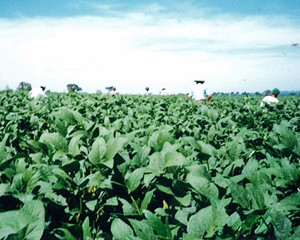Soya traders extend moratorium on Amazon destruction
29/07/09
Greenpeace congratulated Brazilian soya traders for helping to protect the Amazon and avert a climate catastrophe by agreeing to extend the moratorium on buying soya linked to Amazon destruction for another year.
The landmark moratorium was first agreed in 2006 following a campaign by Greenpeace.
"This is the sort of industry initiative we need to stop the destruction of the Amazon and help to prevent runaway climate change. It was only possible because companies worldwide demanded it, knowing that their customers would not want to buy products linked to Amazon rainforest destruction,"said Paulo Adario, Greenpeace Amazon Campaign director.
"Now all eyes are on President Lula to demonstrate his government’s leadership by increasing efforts to govern the Amazon and to stop deforestation across all sectors.”
The soya moratorium extension was announced at a press conference in Brasília attended by Brazil’s Environment Minister Carlos Minc and the Soya Working Group.
Soya cultivation in the Amazon increased dramatically about 15 years ago with the introduction of new cultivars that were suitable for the climate and soils. It can be argued that soy itself is not a major displacer of forest, but more it encourages infrastructure developments and forces cattle ranchers into the forest.
 "Soya is no longer a significant force in the destruction of the Amazon rainforest. However, we cannot say the same about cattle. The soya moratorium is a model for all relevant sectors,” said Brazil’s Environment Minister Carlos Minc.
"Soya is no longer a significant force in the destruction of the Amazon rainforest. However, we cannot say the same about cattle. The soya moratorium is a model for all relevant sectors,” said Brazil’s Environment Minister Carlos Minc.
The extension was also welcomed by the European companies that supported its establishment in 2006, so that they could guarantee soya linked to Amazon destruction did not end up in their products.
"We want to ensure that our actions help protect the Amazon rainforest. The moratorium has been a positive step in helping us control and monitor the soya used in our supply chain and we will continue to participate in efforts to stop deforestation in the Amazon," said Denis Hennequin, McDonald's Europe president.
More recently, Greenpeace has highlighted the central role played by beef, leather and shoe companies worldwide in Amazon destruction, in the investigative report “Slaughtering the Amazon”, released in June 2009. Some companies, such as Nike, have already responded by warning Brazil’s beef and leather industry, which destroys more rainforest than any other sector, that they will no longer buy their products unless it can be demonstrated that they are free from Amazon destruction. The same position was adopted by large supermarket chains operating within Brazil, including Wal-Mart and Carrefour.
Tropical deforestation accounts for up to a fifth of greenhouse gas emissions, more than all the world’s airplanes, trains and cars. It has led Brazil to become the world’s fourth worst climate polluter and means that runaway climate change cannot be averted unless deforestation is stopped.
Greenpeace is calling on all Heads of State to attend the climate summit in Copenhagen in December and ensure an effective deal to avert the climate crisis. As part of the deal, President Lula must commit to stopping Amazon deforestation by 2015 and developed countries must provide the financial backing his government needs to effectively monitor and govern the rainforest. In addition, funds are required for the millions of people who depend on the forest to develop new conservation minded industries that do not involve cutting the rainforest down.
"Compensation for environmental services would be a great incentive to the rural producer to stop deforesting. The industry expects that by the end of the year, in Copenhagen, the governments of different countries will commit to put a fund together for forest protection which will include compensation," said Carlo Lovatelli, President of the Brazilian Association of Vegetable Oils Industries.